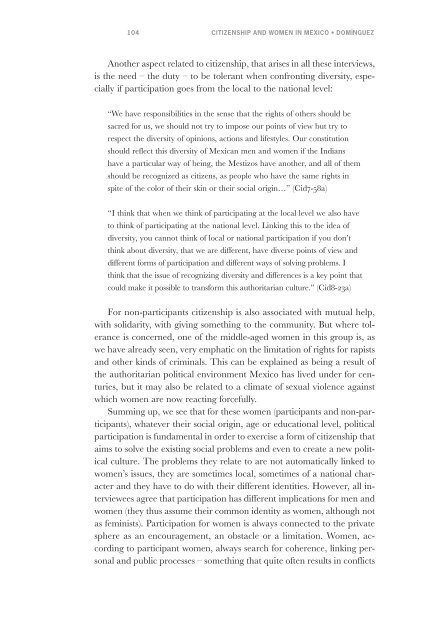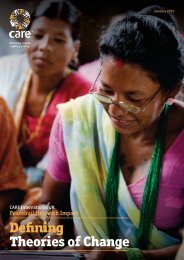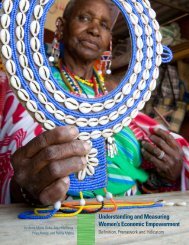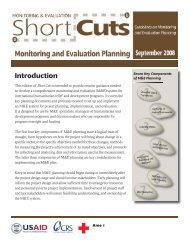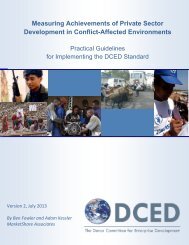Discussing Women's Empowerment - Sida
Discussing Women's Empowerment - Sida
Discussing Women's Empowerment - Sida
Create successful ePaper yourself
Turn your PDF publications into a flip-book with our unique Google optimized e-Paper software.
104<br />
CITIZENSHIP AND WOMEN IN MEXICO • DOMÍNGUEZ<br />
Another aspect related to citizenship, that arises in all these interviews,<br />
is the need – the duty – to be tolerant when confronting diversity, especially<br />
if participation goes from the local to the national level:<br />
“We have responsibilities in the sense that the rights of others should be<br />
sacred for us, we should not try to impose our points of view but try to<br />
respect the diversity of opinions, actions and lifestyles. Our constitution<br />
should reflect this diversity of Mexican men and women if the Indians<br />
have a particular way of being, the Mestizos have another, and all of them<br />
should be recognized as citizens, as people who have the same rights in<br />
spite of the color of their skin or their social origin…” (Cid7-58a)<br />
“I think that when we think of participating at the local level we also have<br />
to think of participating at the national level. Linking this to the idea of<br />
diversity, you cannot think of local or national participation if you don’t<br />
think about diversity, that we are different, have diverse points of view and<br />
different forms of participation and different ways of solving problems. I<br />
think that the issue of recognizing diversity and differences is a key point that<br />
could make it possible to transform this authoritarian culture.” (Cid8-23a)<br />
For non-participants citizenship is also associated with mutual help,<br />
with solidarity, with giving something to the community. But where tolerance<br />
is concerned, one of the middle-aged women in this group is, as<br />
we have already seen, very emphatic on the limitation of rights for rapists<br />
and other kinds of criminals. This can be explained as being a result of<br />
the authoritarian political environment Mexico has lived under for centuries,<br />
but it may also be related to a climate of sexual violence against<br />
which women are now reacting forcefully.<br />
Summing up, we see that for these women (participants and non-participants),<br />
whatever their social origin, age or educational level, political<br />
participation is fundamental in order to exercise a form of citizenship that<br />
aims to solve the existing social problems and even to create a new political<br />
culture. The problems they relate to are not automatically linked to<br />
women’s issues, they are sometimes local, sometimes of a national character<br />
and they have to do with their different identities. However, all interviewees<br />
agree that participation has different implications for men and<br />
women (they thus assume their common identity as women, although not<br />
as feminists). Participation for women is always connected to the private<br />
sphere as an encouragement, an obstacle or a limitation. Women, according<br />
to participant women, always search for coherence, linking personal<br />
and public processes – something that quite often results in conflicts


